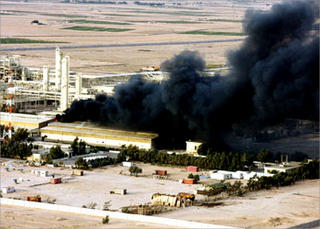Grim Iraq reality dawns for Bush :


After setting out to establish a democracy, the US slowly realizes an Islamic republic is taking shape
By Robin Wright and Ellen Knickmeyer
08/16/05 "The Standard"
-- -- The Bush administration is significantly lowering expectations of what can be achieved in Iraq, recognizing that the United States will have to settle for far less progress than originally envisioned during the transition due to end in four months, according to US officials.
America no longer expects to see a model new democracy, a self-supporting oil industry or a society where most people are free from serious security or economic challenges.
``What we expected to achieve was never realistic given the timetable or what unfolded on the ground,'' said a senior official involved in policy since the 2003 invasion. ``We are in a process of absorbing the factors of the situation we're in and shedding the unreality that dominated at the beginning
.''The realities of daily life are a constant reminder of how initial US ambitions have not been fulfilled in ways that Americans and Iraqis once anticipated. Many of Baghdad's six million people go without electricity for days in 48-degree-Celsius heat. Parents fearful of kidnapping are keeping children indoors.
Barbers post signs saying they do not shave men, after months of barbers being killed by religious extremists. Ethnic or religious-based militias police the northern and southern portions of Iraq. Analysts estimate that in the whole of Iraq, unemployment is 50 percent to 65 percent
.US officials say no turning point forced a reassessment. ``It happened rather gradually,'' said the senior official, triggered by everything from the insurgency to shifting budgets to US personnel changes in Baghdad.
The debate over a new constitution has particularly driven home the gap between the original US goals and realities after almost 28 months.
But whatever the outcome on specific disputes, the document on which Iraq's future is to be built will require laws to be compliant with Islam. Kurds and Shiites are expecting de facto long-term political privileges.
And women's rights will not be as firmly entrenched as Washington has tried to insist, US officials and Iraq analysts say.
``We set out to establish a democracy, but we're slowly realizing we will have some form of Islamic republic,'' said another US official familiar with policymaking from the beginning.
US officials now acknowledge that they misread the strength of sentiment among Kurds and Shiites to create a special status. The Shiites' request this month for autonomy to be guaranteed in the constitution stunned the Bush administration, even after more than two years of intense intervention in Iraq's political process, they said.
``We didn't calculate the depths of feeling in both the Kurdish and Shiite communities for a winner-take-all attitude,'' said Judith Yaphe, a former CIA Iraq analyst at the National Defense University.
In the race to meet autumn deadlines, the process of forging national unity behind the constitution is largely being scrapped, said officials involved in the transition.
``We are definitely cutting corners and lowering our ambitions in democracy building,'' said Larry Diamond, a Stanford University democracy expert who worked with the US occupation government and wrote the book Squandered Victory: The American Occupation and the Bungled Effort to Bring Democracy to Iraq.
``Under pressure to get a constitution done, they've lowered their own ambitions in terms of getting a document that is going to be very far-reaching and democratic. We also don't have the time to go through the process we envisioned when we wrote the interim constitution - to build a democratic culture and consensus through debate over a permanent constitution,'' he said.
The goal now is to ensure a constitution that can be easily amended later so Iraq can grow into a democracy, US officials say.
On security, the administration originally expected the US-led coalition to be welcomed with rice and rose water, traditional Arab greetings, with only a limited reaction from loyalists of ousted Iraqi President Saddam Hussein. The surprising scope of the insurgency and influx of foreign fighters has forced Washington to repeatedly lower expectations - about the time-frame for quelling the insurgency and creating an effective and cohesive Iraqi force capable of stepping in, US officials said.
Killings of members of the Iraqi security force have tripled since January. Iraq's ministry of health estimates bombings and other attacks have killed 4,000 civilians in Baghdad since Prime Minister Ibrahim al-Jaafari's interim government took office April 28.
Last week was the fourth-worst week of the war for US military deaths in combat, and August already is the worst month for deaths of members of the National Guard and Reserve
.Washington now does not expect to fully defeat the insurgency before departing, but instead to diminish it, officials and analysts said. There is also growing talk of turning over security responsibilities to Iraqi forces even if they are not fully up to original US expectations.
``We've said we won't leave a day before it's necessary. But necessary is the key word - necessary for them or for us? When we finally depart, it will probably be for us,'' a US official said.
Pressed by the cost of fighting an escalating insurgency, US expectations for rebuilding Iraq, and its US$20 billion (HK$156 billion) investment, have fallen the furthest, current and former officials say.
Pentagon officials originally envisioned Iraq's oil revenue paying many post-invasion expenses. But Iraq, ranked among world leaders behind Saudi Arabia in proven oil reserves, is incapable of producing enough refined fuel amid a car-buying boom that has put about one million more vehicles on the road in the postwar period. Lines for subsidized cheap gas stretch for kilometers every day in Baghdad
.Oil production is estimated at 2.22 million barrels a day, short of the goal of 2.5 million. Iraq's prewar high was 2.67 million barrels a day.
Link Here




0 Comments:
Post a Comment
<< Home